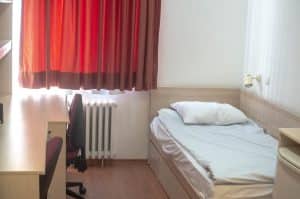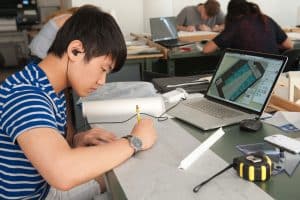15 Features to Look for During Your Campus Tour
Choosing the right college is a significant decision, and evaluating the features to look for during your campus tour is a vital part of that process. It’s more than just a walk around the grounds; it’s an opportunity to experience the campus through the lens of a student. While exploring, it’s crucial to look beyond the surface. Consider how each aspect of the campus aligns with your academic and personal needs. Are the facilities state-of-the-art? Is the campus environment welcoming? How comfortable and secure are the accommodations?
This guide will take you through 15 essential features to observe and assess during your campus tour, ensuring you gather all the information needed to make a well-informed decision.
1. Academic Facilities
The heart of any educational institution, and a key feature to look for during your campus tour, is its academic facilities. When touring, pay close attention to the libraries, laboratories, and lecture halls. Libraries should be more than just book repositories; they need to be centers of knowledge with access to various resources, including digital databases and quiet study areas. Laboratories should boast the latest equipment, reflecting the institution’s commitment to providing practical, hands-on experiences in your field of study.

For those with specific interests, such as the arts or sciences, check for specialized facilities like art studios or advanced research labs. Lecture halls, too, play a critical role. They should be more than just seating spaces; they should be well-designed, equipped with modern technology, and conducive to learning. These environments will form the backdrop to your academic journey, so it’s essential they meet your expectations for a quality education.
2. Campus Environment
A campus is more than buildings and classrooms; it’s a community. The environment and atmosphere can significantly impact your college experience. As you walk the campus, take in the overall ambiance. Is it a bustling hub of activity or a calm, serene space? Notice the layout – are the buildings and facilities easily accessible? The architectural style can also influence the campus vibe.
Additionally, consider the maintenance and upkeep of the campus. Well-maintained grounds and facilities not only add to the aesthetic appeal but also reflect the institution’s pride and commitment to providing a pleasant learning environment. Don’t forget to observe the interaction among students; it’s a telltale sign of the campus culture. You want to find a campus that feels like a community where you can thrive academically and socially.
3. Accommodation Options
Accommodation plays a crucial role in your college experience, making it one of the key features to look for during your campus tour. When visiting dormitories, consider more than just the room size. Think about the layout – do you prefer a single room or a shared space? What are the policies on visitation and noise? Check the proximity to essential campus facilities like dining halls, libraries, and recreational centers. Don’t overlook the amenities offered – common areas, laundry facilities, and internet access are all important for comfort and convenience.

Also, inquire about the security measures in place for residential areas. Living on campus is about finding a balance between comfort, convenience, and community. The right accommodation can significantly enhance your college life, providing a safe and supportive home away from home.
4. Recreational Facilities
Recreational facilities on campus are not just amenities; they’re vital for a balanced college experience. When touring these areas, look beyond the basics. A well-equipped gym, diverse sports facilities, and spaces for creative arts reflect the institution’s dedication to student life outside academics. Check if there are fields and courts for various sports, including less common ones that might interest you.
Art studios, music rooms, and performance theaters can be crucial for those inclined toward creative pursuits. These facilities should be well-maintained and accessible. Ask about the recreational programs and clubs available. Are there intramural sports teams, fitness classes, or art workshops? These activities not only enrich your college life but also provide opportunities to meet people with similar interests and stay healthy, both physically and mentally.
5. Safety and Security
Safety and security are paramount in any campus setting. A secure environment is essential for peace of mind and focus on academic and social activities. During your tour, observe the security measures in place. Are there campus security personnel visible? Look for emergency phones, well-lit pathways, and secure access to buildings. Inquire about the campus’s safety protocols, such as emergency alerts and response plans.

Don’t hesitate to ask about crime statistics and safety initiatives. A campus’s approach to safety speaks volumes about its care for student well-being. Additionally, consider the surrounding area of the campus. Is it located in a safe neighborhood? The overall safety of your environment is key to ensuring a comfortable and worry-free college experience.
6. Food and Dining Options
One of the key features to look for during your campus tour is the food and dining options. Food is more than sustenance; it’s a significant part of campus life. Dining options can greatly influence your daily routine and lifestyle. During your tour, visit various dining halls and eateries. Look for the quality and variety of food offered. Are there healthy, nutritious options? Is there a good balance between comfort food and dietary-conscious choices? Check if dietary restrictions are accommodated, such as vegetarian, vegan, or gluten-free options. Observe the meal plan structures – are they flexible and accommodating to different schedules?
Also, consider the social aspect of dining. Are the dining areas conducive to socializing and comfortable enough for long study sessions? The availability of quality food options and a pleasant dining environment are essential for maintaining your health and enjoying your time on campus.
7. Health and Wellness Resources
Health and wellness resources are crucial for supporting your physical and mental well-being throughout college. When touring the campus, look for the availability and accessibility of medical facilities. Is there an on-campus clinic? How does the institution handle medical emergencies? Mental health support is equally important. Inquire about counseling services, mental health programs, and any stress-relief initiatives.
Find out about fitness centers and wellness programs. Are there gym facilities, yoga classes, or meditation spaces? A campus that prioritizes the health and wellness of its students demonstrates a commitment to their overall success and well-being. These resources play a critical role in ensuring you stay healthy and can fully engage in your academic and social life.
8. Tech Resources and Connectivity
Tech resources and connectivity are essential for academic success in today’s digital age. During your campus tour, assess the availability and quality of technological resources. Are there ample computer labs, and are they equipped with up-to-date hardware and software? Check the Wi-Fi coverage across campus; it should be strong and reliable, not just in academic buildings but also in residential areas and common spaces.

Inquire about the tech support available – is there an IT helpdesk, and what services do they offer? Don’t forget to ask about online learning platforms and digital library resources, especially if you anticipate engaging in hybrid or online courses. A campus with robust tech resources demonstrates a commitment to providing a modern educational experience and ensures you have the tools necessary for effective learning and research.
9. Student Support Services
As you set out on your campus tour, look for the features and the critical components that can elevate your college experience. Support services are a cornerstone of a successful college experience. These services range from academic advising and tutoring to support for students with disabilities. During your visit, inquire about the availability and accessibility of these services. How does the campus support academic success and address individual learning needs? Are there mentoring programs or peer tutoring available? For students with disabilities, assess the availability of accommodations and tailored support services.
Additionally, language support services can be crucial for international students. These support systems are not just about overcoming challenges; they’re about ensuring every student has the opportunity to thrive in their academic and personal life. A campus that invests in comprehensive student support shows a deep commitment to the success and well-being of its student body.
10. Extracurricular Activities and Clubs
Extracurricular activities and clubs play a pivotal role in the college experience, offering opportunities for personal growth, skill development, and community building. While exploring the campus, get a sense of the extracurricular scene. Are there clubs and organizations for a wide range of interests, from academic and professional to cultural and leisure?

Find out how you can get involved in these activities and the process of starting a new club if your interests aren’t currently represented. These organizations are not just about hobbies; they’re avenues for leadership development, networking, and creating a well-rounded college experience. A campus with a vibrant extracurricular community provides a more fulfilling and engaging college life, allowing you to explore interests beyond the classroom and form lasting friendships.
11. Career Services and Internship Opportunities
Career services and internship opportunities are key to transitioning from college to the professional world. These services can play a crucial role in shaping your future career. As you explore the campus, don’t forget to inquire about the career center and its resources – one of the key features to look for during your campus tour. What kind of career counseling, resume workshops, and interview preparation are available? Are there job fairs and networking events with potential employers? Internship opportunities are equally important.
Find out how the campus connects students with internships relevant to their field of study. Are there partnerships with local businesses or organizations? A campus that provides robust career services and internship opportunities demonstrates a commitment to the professional success of its students, giving you a valuable head start in your career journey.
12. Public Transportation and Campus Accessibility
The accessibility of a campus and its connection to public transportation are important for your mobility and independence. Assess the ease of getting around the campus itself. Is the campus wheelchair accessible, and are buildings equipped with necessary accommodations? Consider the availability of campus shuttles, especially if the campus is large or spread out.
Also, evaluate the campus’s connection to the wider community. How easily can you travel to local amenities, entertainment venues, or internships and job opportunities? Are there convenient public transportation options nearby? A campus with good accessibility and transportation links not only makes daily life more convenient but also enriches your college experience by facilitating exploration and engagement with the surrounding community.
13. Sustainability and Environmental Initiatives
Sustainability and environmental initiatives on campus are not just about green spaces; they reflect the institution’s commitment to future generations. During your tour, observe the campus’s efforts in sustainability. Are there recycling programs, energy-efficient buildings, and initiatives to reduce carbon footprint? Look for evidence of sustainable practices like solar panels, water conservation methods, and environmentally friendly transportation options.

Inquire about courses or programs focused on sustainability and environmental studies. Additionally, student involvement in these initiatives can be a good indicator of the campus culture around sustainability. A campus that prioritizes these efforts shows a dedication to fostering responsible citizens and creating a healthier environment for everyone.
14. Research Opportunities
One of the key features to look for during your campus tour is the research opportunities. Research opportunities are a cornerstone of academic advancement and personal growth in college. When you’re on your campus tour, make sure to inquire about the types of research projects available to students. Are there opportunities for undergraduate students to engage in research, or are they primarily reserved for graduate students? Look into the diversity of research areas — whether in the sciences, humanities, social sciences, or interdisciplinary fields.
Equally important are the resources provided for these projects. Ask about grant opportunities or funding available for student research. This could include travel grants for fieldwork, funding for equipment, or financial support for presenting at conferences. Such backing is crucial for students to immerse themselves fully in their research endeavors without financial constraints. Understanding the extent and nature of these opportunities can give you a clear picture of how the institution supports and fosters a research-oriented environment.
15. Alumni Network and Community Engagement
A strong alumni network and opportunities for community engagement can significantly enhance your educational journey. When visiting the campus, find out about the alumni association and the support it provides. How active is the alumni network in mentoring current students and offering career opportunities? Community engagement is equally important.
Look for opportunities to participate in community service projects, local outreach programs, and partnerships with local organizations. These experiences not only contribute to personal growth but also help build a sense of responsibility and connection to the broader community. A campus that facilitates these connections demonstrates a commitment to creating a well-rounded, socially responsible graduate.

How Can You Maximize Your Campus Tour Experience?
Making the most of your campus tour is essential for an informed college decision, so focus on identifying the various features to look for during your visit, ranging from academic programs to student life. Start by preparing a list of questions to ask during the tour. These can range from specific academic queries to general questions about student life. Key areas to focus on include academic programs, student support services, and campus facilities. Don’t hesitate to engage with tour guides, faculty members, and even current students you meet along the way; they can provide valuable firsthand insights.
Pay attention to not just the main attractions but also the less highlighted areas like study lounges, common areas, and even parking facilities. These places can offer a glimpse into the day-to-day student experience. If possible, try to visit a class in session or spend time in a student cafeteria to get a feel for the campus vibe. Remember, this tour is your opportunity to see if the campus feels like a place where you can thrive.
Comparing and Contrasting Different Campuses
When comparing different campuses, it’s important to consider various factors to find the best fit for you. Beyond the basic comparisons of academic programs and facilities, think about the campus environment, culture, and community. How does each campus make you feel? Does one seem more aligned with your personality and lifestyle?
Consider the location and size of each campus. Do you prefer a large university in an urban setting or a smaller college in a more rural area? Assess the availability of extracurricular activities and clubs that match your interests. Another critical factor is the student support services offered, such as career counseling, health services, and academic advising.
Make notes during each campus tour and take photos if possible. After visiting each campus, compare these notes to help in making a balanced decision. Remember, the goal is to find a college where you will be happy and successful, both academically and personally.
Post-Tour Reflection and Evaluation
After completing your campus tours, take time for reflection and evaluation. Create a list or a chart to organize your thoughts and impressions of each campus. Consider aspects like the overall feel of the campus, the attitude of the people you meet, the quality of the facilities, and how well your academic and extracurricular interests are catered to.
Reflect on how well each campus aligns with your educational and career goals. Were there any programs or opportunities that stood out to you? How did each campus address your concerns or questions during the tour? Think about your long-term goals and how each campus can help you achieve them.
Discussing your thoughts and feelings with family, friends, or a guidance counselor is also important. They can offer different perspectives or raise questions you might not have considered. Ultimately, your post-tour reflection and evaluation should lead you to the right academic and personal decision, setting the stage for a rewarding college experience.

Conclusion
Your campus tour is more than just a visit; it’s a crucial step in evaluating the features to look for during your campus tour, which will determine where you spend some of the most formative years of your life. Each of these 15 features plays an integral role in shaping your overall college experience. As you explore the campus, take the opportunity to observe, ask questions, and envision yourself as part of the community. The best choice for you is such a college that not only meets your academic needs but also, in addition to that, takes care of your personal well-being by providing opportunities for growth in other areas of your life. Take this as a guide to help you make an informed decision about your future educational home. What you choose at this point will guide the path of excellence and fulfillment that indeed lie ahead of you for many years to come.



































